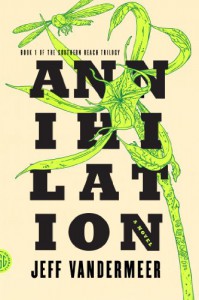108
Followers
112
Following
Aerin
"Books are the plane, and the train, and the road. They are the destination, and the journey. They are home."
- Anna Quindlen
Review: Annihilation, by Jeff Vandermeer

Annihilation is a beautiful mindfuck of a book. Told in evocative, meticulous prose, it describes an expedition into an uncharted and sinister terrain. Four women, referred to only by their titles - biologist, psychologist, anthropologist, surveyor - are recruited by the Southern Reach, a shadowy government agency, to venture into a region of south Florida known as Area X. Once a lightly-populated coastal wilderness adjoining a military base, an incomprehensible Event some thirty years ago transformed the landscape into an ominous grotesque, a deadly but ineffable biological menace. Like a cancer, the tainted biosphere seems to have arisen from its own rotted DNA. And, like a cancer, Area X is growing.
Theirs is the twelfth expedition. During their training, the members were not told much about the fate of their predecessors - only that the first expedition reported nothing unusual, "just pristine, empty wilderness". But the second expedition ended in mass suicide, and the third slaughtered each other. The Southern Reach no longer permits expedition members to bring weapons.
The biologist, our narrator, has a more personal connection to the program than her compatriots do: Her husband had been a member of the eleventh expedition. He returned, or his body did, but he had been reduced to some kind of shell or facsimile. He evinced a blank and dreamlike demeanor, and spoke seldom. Within six months of his return, he died from an aggressive, mysterious cancer. The seven other members of his expedition, she later learned, had all met the same fate.
The biologist's expertise in transitional environments qualifies her for the expedition, but her motives for joining are personal. It's not so much that she aches to learn what really happened to her husband, but that she covets the serenity he had apparently found on his journey: "At the time, I was seeking oblivion, and I sought in those blank, anonymous faces, even the most painfully familiar, a kind of benign escape. A death that would not mean being dead."
In this book, Vandermeer juxtaposes those heartbreakingly human desires against the unknowable, alien intelligence of Area X - this sinister, inexorable force that reads, remakes, infects, transforms. The region teems with tortured beings: turgid monsters with human eyes, crumbling villages full of strangely anthropoid vegetation, a distant moaning at twilight. And a tower buried in the ground, with walls that seem to sweat, and breathe, inscribed with ominous words made of insects and mold.
It is the tower that dominates the narrative from the very beginning. Annihilation has one of the best opening paragraphs I have ever read, which perfectly sets the tone:
As the biologist descends into the tower, the words that spiral down its walls begin to infect her frame of mind. Formed of living mold, she inhales their spores, and she starts to grasp their terrible meaning: "Where lies the strangling fruit that came from the hand of the sinner I shall bring forth the seeds of the dead..."The tower, which was not supposed to be there, plunges into the earth in a place just before the black pine forest begins to give way to swamp and then the reeds and wind-gnarled trees of the marsh flats. Beyond the marsh flats and the natural canals lies the ocean and, a little farther down the coast, a derelict lighthouse. All of this part of the country had been abandoned for decades, for reasons that are not easy to relate. Our expedition was the first to enter Area X for more than two years, and much of our predecessors' equipment had rusted, their tents and sheds little more than husks. Looking out over that untroubled landscape, I do not believe any of us could yet see the threat.
Contaminated by the tissue and the mind of Area X, the biologist's consciousness starts to mutate and the boundaries between herself and the landscape begin to blur. Exploring further into the wilderness, toward the foreboding lighthouse at its center, the unraveling expedition strays farther and farther from its ostensible purpose, as one by one its members succumb to the terrifying reality warping the heart of Area X.
In some ways, this book is pure horror. In others, an exquisitely described biological dreamscape. It works as both hard science fiction and as philosophical fantasy. But what particularly fascinates and disturbs me about this incredible novel is how the biologist's transformation, though harrowing and unfathomable, is an utterly natural progression, a plausible, even inevitable evolution. We are all creatures of our environment, after all.
 3
3



